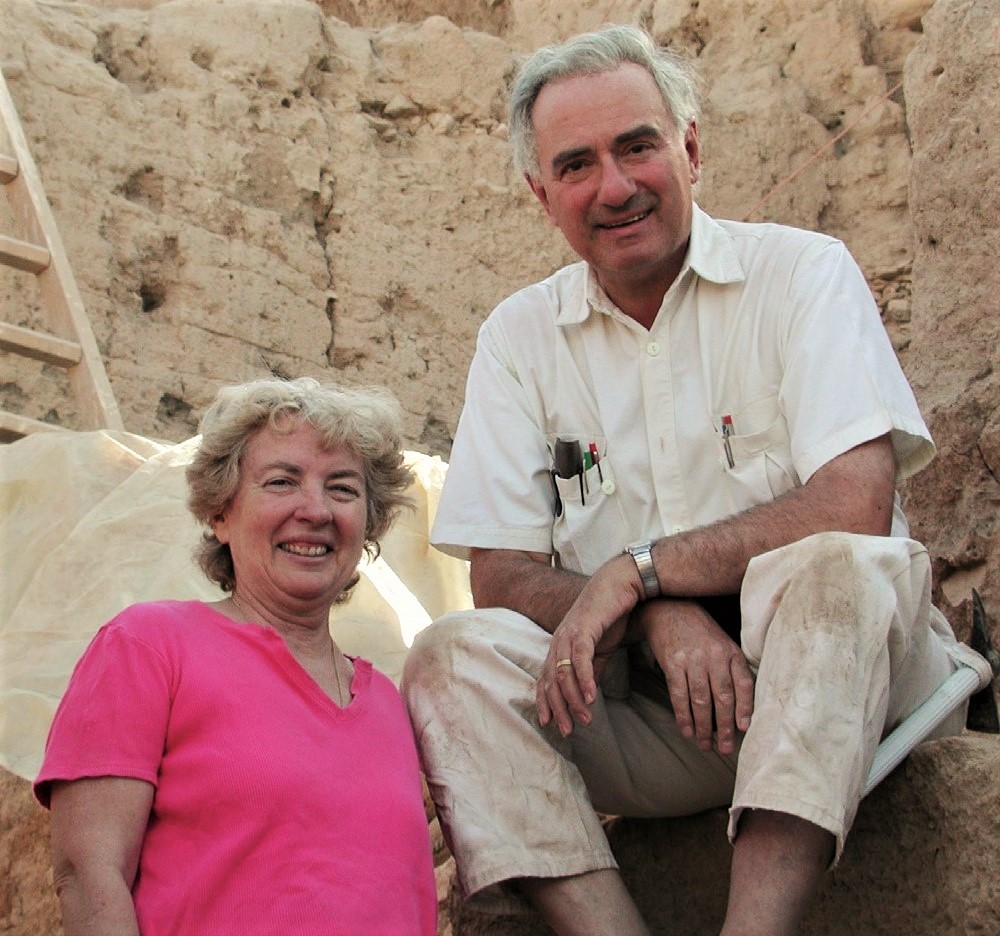Networking science.
Giorgio Buccellati and Marilyn Kelly-Buccellati

Balzan Prizewinners 2021 for
Art and Archaeology of the Ancient Near East
Since 1984, they have been leading the excavations in the ancient city of Urkesh – today known by the name of Tell Mozan – in Syria: Giorgio Buccellati and his wife Marilyn Kelly-Buccellati.
The origins of this city date back six thousand years. For three millennia, it was regarded as an important political and religious centre of an almost-unknown Mesopotamian culture: the Hurrians. This culture is now coming to light again thanks to the couple’s work. The Bucellatis are being awarded the 2021 Balzan Prize «for their achievements in the study of Hurrian culture and for highlighting its importance as the foundation of a great urban civilization, among the most flourishing in the ancient Near East in the third millennium BC; for promoting a digital approach to the study of archaeology; and for enhancing theoretical reflection on the nature of this discipline.»
Giorgio Buccellati (born in 1937) is Professor emeritus of Languages and History at the University of California, Los Angeles (UCLA), where he still teaches and founded the Institute of Archaeology in 1973. He is also the director of IIMAS - International Institute for Mesopotamian Area Studies. Marilyn Kelly-Bucellati is Professor emerita at California State University, Los Angeles. Together they have carried out archaeological excavations in the Near East region, mainly in Syria but also in Turkey and the Caucasus.
What award-winning researchers pass on to young, upcoming researchers
Interview by Astrid Tomczak-Plewka with Giorgio Buccellati and Marilyn Kelly-Buccellati
Giorgio Buccellati and Marilyn Kelly-Buccellati, how would you explain your field of research to my 14-year-old daughter?
GB (laughs): Well, it’s basically about discovering the people behind the things. Children have a lot of imagination, they see dolls and make up stories about them. In our case, the stories are real. The fun is discovering the real life behind the excavations.
MKB: And you can’t be afraid of getting your hands dirty, we’re digging around in dirt all the time. Even when I was a child, I loved making mice out of mud.
What does the Balzan Prize mean to you?
GB: It’s a special award – actually it’s more of a commitment than a prize, because we are developing a research project with it. So, it’s bit like receiving a scholarship. We work with young people from all over the world – especially Syria, Europe, the USA and China – and so bring together different strands of our research that we wouldn’t be able to fund without this support.
MKB: The award makes us feel very valued. Many of our students have suffered a lot because of the Covid-19 pandemic, for example because they were separated from their families and couldn’t visit them. This award has encouraged them – and us too, of course.
You serve as role models for these young people. What role models did you have in your career?
MKB: For me it wasn’t a person, it was a book. I used to live in a small town in New Jersey and loved going to the library. When I was about 12 or 13 years old, I read a book about the Dead Sea Scrolls. I thought it was extremely interesting and wonderful. Then I knew I wanted to become an archaeologist.
GB: My role model is my wife. I began my career as a philologist, my first assignment in the field was as an inscription researcher in Iraq. Then I married Marilyn and she converted me to archaeology.
What would you like to pass on to young researchers who want to follow in your footsteps?
GB: That’s a very important question. And I think it’s about passing on values. Today, we talk a lot about technologies and use them, which is great. We need expertise, but we shouldn’t lose sight of values, which takes me back to my first answer. It’s always about the people behind the things. It’s interesting: on the one hand, technology connects people, but on the other, we live in anonymity and there are very many lonely people.
MKB: I can only emphasize that. We identify both with the people of antiquity and with the people we work with. For example, time and again we had taught people who worked on our excavation sites, then I might have forgotten a certain Arabic expression and someone comes up to me and explains which word I’m looking for. So, we are connected not only to the people of antiquity, but also to our contemporaries.
GB: I would like to add something: there’s a complicated technical term for what we do: hermeneutics. We explore the human dimension behind the silent messages that antiquity has left behind.
Swiss Academies of Arts and Sciences
House of Academies
Laupenstrasse 7
P.O. Box
3001 Bern
Switzerland